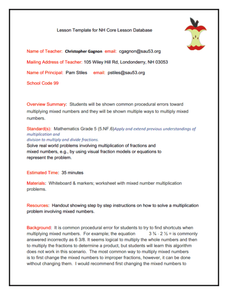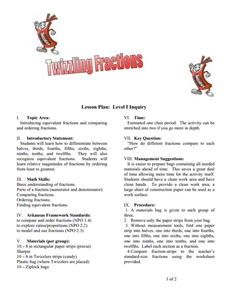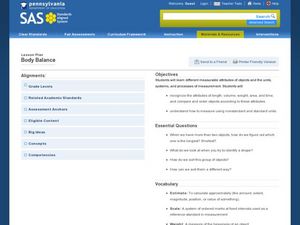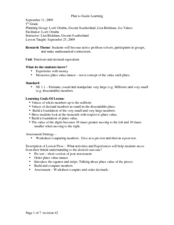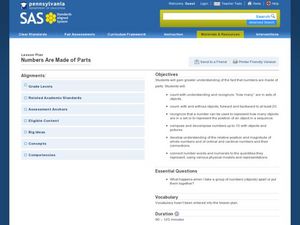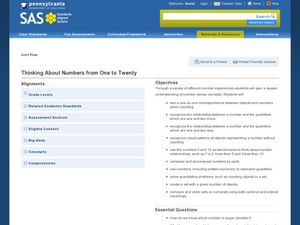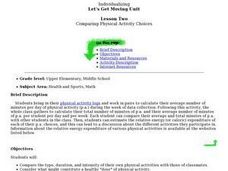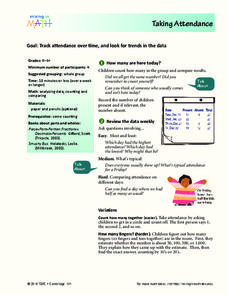Curated OER
Two-Digit Quotients
In this mathematics worksheet, 6th graders find the quotient for each problem. They estimate first and identifying which number they will use. Then, students divide the problem and multiply to check.
Curated OER
Multiplying Mixed Numbers
In this multiplying mixed numbers worksheet, students with a partner problem solve and calculate the answers to ten word problems and mathematical equations.
Curated OER
Multiply Whole Numbers and Decimals: Reteach
In this whole number and decimal multiplication learning exercise, students review the three steps to multiply whole numbers and decimals. Students then find the products for the sixteen problems.
Houghton Mifflin Harcourt
Math Skiils: Comparing Integers on a Number Line
Here is an attractive assignment that instructs learners how to compare more than one integer on a number line. After the lesson, three practice problems follow. They require learners to place integers on a number line and then order...
Curated OER
Relating Fractions and Decimals
Sixth graders identify how fractions and decimals both illustrate parts of a whole. They estimate which number is greater by comparing them to the given fraction and use greater than or less than symbols for each.
Curated OER
Estimating Solutions
Finding approximate solutions to word problems allows users to assess the reasonableness of their answers. In a well-paced instructional activity, the class rounds numbers to estimate the solutions. They explain their thinking and...
Ohio Department of Education
Fraction Models - Grade Three
Explore fractions using different manipulatives and illustrations. Your class can create a variety of models of fractions and mixed numbers with drawings and manipulatives. They then work to compare fractions, mixed numbers, and whole...
University of Arkansas
Twizzling Fractions
Using food as a manipulative is one of the best ways to incorporate hands-on learning in the classroom. This hands-on approach allows young mathematicians to compare, order, and identify fractions with the use of Twizzlers® and...
Curated OER
Body Balance
Examine measurable characteristics of objects to build an understanding of the different ways you can discuss an object's size when comparing it to other objects. After whole group instruction, the class compares and organizes several...
Curated OER
Earth Day Number Sense
Elementary schoolers count and order objects using numbers 1-300. They bring recyclable items from home. Students group the items, skip count by 2's, 3's, and 5's, and arrange the items on a number line. Recyclable plastic bags are put...
EngageNY
Estimating Quantities
Apply the concept of magnitude to estimate values and compare numbers. The ninth activity of the 15-part series asks learners to write numbers to their next greatest power of 10 and then make comparisons. Scholars begin to understand the...
Curated OER
Fractions and Decimal Equivalents: Fifth Grade
Sometimes a skeleton is all you get. This lesson outline provides teachers with a basic lesson flow. Pupils will pre-test, order place value names, use manipulatives, and build and compare numbers. How this is to be done is not...
Curated OER
Everyday Mathematics: Ballpark Estimates
In this estimating practice worksheet, learners sharpen their math skills as they learn how to make likely estimates and try the 2 extra practice activities.
Pennsylvania Department of Education
Numbers Are Made of Parts
Children play with barnyard animal cards to practice composing and decomposing numbers. With their "secret number" of animal cards in a cup, they shake and spill them onto a barn story board, counting how many animals fall in the barn...
Curated OER
Telling Time as an Everyday Use of Numbers
How can we estimate time? Have your young mathematicians make a clock. Then they compare and contrast types of clocks. They practice writing times in two different ways and make a book about telling time.
Pennsylvania Department of Education
Thinking About Numbers from 1 to 20
Help your kindergarteners discover new number-sense concepts and to compose and decompose numbers. Though the resource contains no procedural details, the assessment tool (which you can find in the "printer friendly version") has...
Curated OER
Finding PI
Students select and use appropriate operations, methods and tools to compute or estimate using whole numbers. They develop and use formulas for determining the circumference and area of circles. Students determine and describe the...
Curated OER
Comparing Physical Activity Choices
A physical activity log will help your elementary students keep track of their activities. Your class will calculate the average number of physicaly active minutes per day. They compare with other students and then estimate the relative...
Mathematics Vision Project
Quadratic Equations
Through a variety of physical and theoretical situations, learners are led through the development of some of the deepest concepts in high school mathematics. Complex numbers, the fundamental theorem of algebra and rational exponents...
Curated OER
Positive and Negative Numbers
Pupils use blocks and markers to illustrate the processes of adding, subtracting, multiplying and dividing integers. In this mathematics lesson plan, learners use Algebra blocks to demonstrate multiplying polynomials.
Curated OER
Dividing Multi digit Numbers
For this division worksheet, students read through an example of how to divide a multi digit number by a single digit number. They then complete the 9 division problems on the worksheet.
Curated OER
How Far Can You Jump?
Students estimate the distance of student's broad jumps. This activity can take place in the block center with a small group of students. They are explained that they are going to jump from a starting point (marked with the masking...
Curated OER
Taking Attendance
Young mathematicians record and analyze data. They will take attendance for their class and compare to other days. Then discuss ways to count who is present. They may also show the amount of students present using fractions.
Curated OER
Measures
Estimate and explore the length and weight of classroom items using standard measurement and scales. Students will work in groups to determine appropriate measuring tools, weigh or measure items, and record their results on a data chart....



